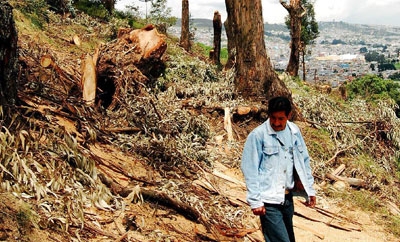Deforestation in Ecuador is occurring at a rate of nearly 66,000 hectares a year, according to official figures, in part due to the depredations of illegal loggers, as well as improper land management.
According to Ecuador’s Environmental Ministry, 65,880 hectares of land are deforested in the country each year. The problem is most serious in the western coastal province of Esmeraldas, where the annual deforestation rate is 12,485 hectares, compared to an average of 3,000 hectares for each of the rest of the country’s provinces or departments, reported La Hora.
Juan Carlos Palacios, director of the Sustainable Management Corporation, said deforestation is driven in part by illegal logging for profit, but also largely by unsustainable forest management practices when clearing trees to use land for other purposes. He also noted that outsiders, not locals, are responsible for much deforestation in places like Esmeraldas’ Cayapas River region.
SEE ALSO: Coverage of Eco Trafficking
Ecuadorean authorities have attempted to combat the problem with schemes such as Socio Bosque — which offers economic incentives to locals to care for the forests.
InSight Crime Analysis
According to 2011 figures from the Food and Agriculture Organization of the United Nations, annual deforestation is much higher than estimated by the Ecuadorean government, at up to 200,000 hectares per annum — around 1.8 percent of the country’s 9.6 million hectares of primary forest. The country’s illegal timber trade is worth around one hundred million dollars, and represents up to 70 percent of wood transported out of some regions of the northwest and the Amazon, including the Yasuni National Park, according to officials.
A report by the Center for International Forestry Research (CIFOR) found that Ecuadorean timber is mainly destined for the domestic market, rather than exportation. However, Peruvians have also attempted to cash in on the country’s natural resources, with four camps of illegal Peruvian loggers, who allegedly planned to sell the timber in the Amazonian city of Iquitos, dismantled during a single month in 2009.
The illegal timber trade is a highly lucrative industry in South America. Brazil and Peru are two countries where it is particularly well-established, with Brazilian environmental campaigners subject to threats and murder, and illegal logging in Peru linked to drug traffickers.

